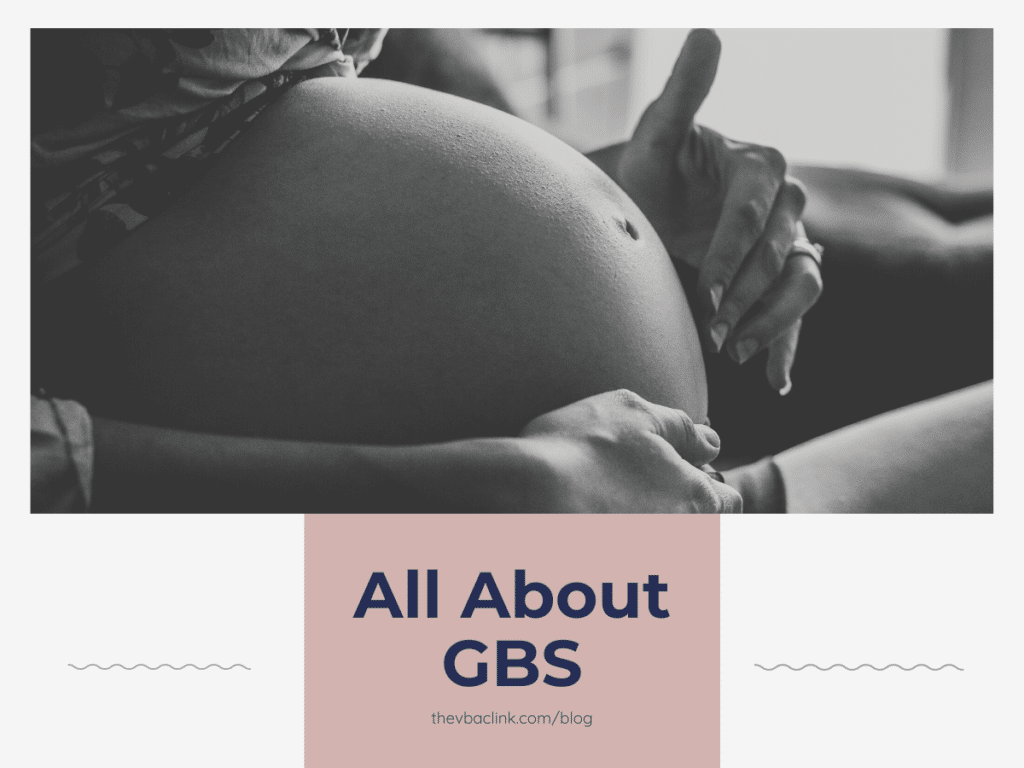These days, the most common request on a birth plan, whether VBAC parent or not, is to avoid interventions. Particularly for parents who want the full benefits of a natural birth, Group B Strep prevention can be a concern.
During pregnancy, providers will typically test a birthing person for something called Group B Strep (GBS). This test has become a little controversial in the birth world because a positive GBS test involves treatment during labor.
In this article, we want to talk about what GBS is, and how to prevent Group B Strep in pregnancy.
Originally published October 10, 2018, this article was updated and republished on January 18, 2021.

What is Group B Strep?
Group B Streptococcus is a type of infection that lives in the intestines and can travel down into the vagina or rectal area. Approximately 25% (AMA, 2017) of healthy pregnant people are carriers during their pregnancy.
Some people hear Group B Strep and think strep throat. Although they both have the word strep, Group B Strep and strep throat are two different types of infections.
Have you ever heard people say that their provider would rather them not labor at home and wants them to go into their birthing location right away after their water breaks? Even if labor hasn’t started. This is especially common for GBS positive mothers.
Providers are concerned about this because, when the bag of waters ruptures, there is a chance that the GBS infection will travel up to the fetus.
Streptococcus B Symptoms
One of the hardest things for people is it’s nearly impossible to know if you have GBS or not without testing. Although, some people are more at risk to have GBS than others.
If you are younger than 20 years old, use tampons, have multiple sex partners, or have recently had sex, it is possible to have slightly higher odds of having GBS.
People are usually tested during their 36th week of pregnancy. This is done via swab to the vagina or rectum. If you test positive, it has become standard practice to receive IV antibiotics during labor to avoid passing the infection to your baby.
The biggest concern with Group B Strep prevention and treatment is the effect of GBS infection on the newborn baby. A newborn can get GBS during labor, which is called a vertical transmission (early infection) of GBS.
When the birthing person’s water breaks and the bacteria travels up to the unborn baby, the baby can swallow the infected fluid. According to ACOG, 50% of people who are colonized with GBS will transfer the infection to their baby.
1-2% of people who don’t treat with antibiotics will have a newborn develop GBS. Babies who have early infection of GBS will typically show signs a few hours, or up to 2 weeks after birth.
Symptoms of Early Onset GBS in a newborn
- Breathing problems: Breathing fast or making grunting sounds could be signs of pneumonia.
- Fussy or sleepy: Although it is common for babies to be fussy, a baby that is over-the-top fussy and or the opposite, very sleepy, can indicate a problem. These may be signs that a newborn is going into sepsis.
- Decrease in blood pressure: If the newborn’s blood pressure is low, it could be a sign of early transmission of GBS.
There is also a way that the baby can get GBS that is not transferred from the birthing person. These symptoms would not typically show up until a month later. Symptoms of late infection of GBS could be the following:
- Breathing problems: As stated above, if you feel like your baby is not breathing well or grunting for air, contact your provider.
- Fever: If your baby has a fever higher than 100.4, it is always recommended to call their provider.
- Pain: If it seems that your baby has pain in moving their body, or lack of movement, this could be a symptom of infection.
- Unexplained redness: GBS could cause unexplained redness on a newborn’s face or other parts of their body.
If you are noticing any of these symptoms, and are worried your baby may have GBS, never hesitate to call your provider.
What Causes Strep B?

It is possible that you are what is called a strep carrier. This means you can have GBS in your body all the time or it can come and go.
The crazy thing about GBS is other than the transfer to newborns, it is unknown how anyone else gets it. That’s what makes Group B Strep prevention difficult. It is believed that it is not transferred through food and water.
Group B Streptococcus Prevention
Some people may question why they are testing positive for GBS when they are healthy overall, eat well, and exercise. As mentioned above, approximately 25% of ALL birthing people will test positive for GBS, even those who are very healthy.
It is possible to test positive for GBS and become negative and vice versa. Many people try their best at Group B Strep prevention during pregnancy, and despite their efforts, still test positive.
Can you get rid of group B Strep?
As we stated above, it is possible to test positive for Group B Strep and then test negative. It can come and go from our bodies.
If you have tested positive for Group B Strep, it is not a bad option to try some of the natural Group B Strep prevention tips listed below, and ask to be re-tested as it gets closer to your due date.
Keep in mind, even with these efforts, it is possible that you will still test positive.
Home Birth and GBS positive?
If you are planning on a home birth or an HBAC, and you test positive for Group B Strep, it is a good idea to discuss the plan when labor begins with your provider.
They may be able to treat with probiotics if that is desired. There is also a cleanse called Hibiclens that may be suggested to treat GBS. Providers may suggest this be used every 2-4 hours with a peri bottle over the toilet to assure it reaches inside the vagina.
Group B Strep Natural Treatment and Prevention

If you are interested in learning more on preventing Group B Strep, we are going to give you some of the known natural treatments and ways to try and prevent your chances of having GBS.
Below are 7 things you can do to try and prevent GBS.
1. Probiotics for Group B Strep
Probiotics have many health benefits. They may impact our mental state, help boost our immune system, and boost the health of our gut flora.
Regardless of Group B Strep prevention, probiotics can help your overall health. Probiotics can also help lower your chances of being GBS positive.
If for any reason, in addition to GBS, you are put on antibiotics during pregnancy, labor, or your postpartum journey, probiotics will ensure you are starting with stronger gut flora.
Check with your provider for recommended dosage and any brands of probiotics they suggest.
2. Garlic
Yes, I know this may sound super strange, but garlic is known as a natural antibiotic. Inserting a clove of garlic vaginally for one night, typically the night or two before being tested, and drinking minced raw garlic in the morning can help get rid of any infection.
Some are worried about the garlic getting lost so they tie it to a string like a tampon.
3. Vitamin C
Taking up to 2,000 mg of vitamin C per day helps boost the immune system. Boosting your immune system can help your body potentially fight any type of infection.
Taking vitamin C during pregnancy has also shown to decrease the chances of pregnant people being hospitalized. A study showed “42.2% women in the vitamin C group and 27.9% in the control group were not hospitalized during pregnancy; this difference was found statistically significant.”
4. Grapefruit Seed Extract
Taken orally, grapefruit seed extract has a lot of great antimicrobial properties and may reduce the chances of infection and prevent group B strep.
5. Lactobacilli
Lactobacilli are the most abundant vaginal bacteria. Lactobacilli prevents infection. Just like many things in our bodies emotional stress can diminish the Lactobacilli in the body, possibly enhancing chances of infection. Lactobacilli comes in capsules and it is important to follow the dose suggested on the bottle or by your provider.
6. Apple Cider Vinegar Rinse
Rinsing vaginally with apple cider vinegar will help you absorb good nutrients and has been known to help kill bad bacteria. You can also take a shallow bath filled with water and some apple cider vinegar.
7. Eating a Healthy Diet
Our bodies need a healthy diet to perform well. When we are pregnant, a healthy diet is extra important. Dialing in and focussing on your nutrition during pregnancy will make sure that you get enough protein, fats, and carbohydrates. Try and eliminate processed sugars as well.
Antibiotics for GBS

Group B Strep prevention in newborns is most often accomplished by administering IV antibiotics during labor.
Just like most things in life, there are pros and cons to both accepting antibiotics, and not accepting antibiotics. We want to help make it easier for you to know both the benefits and risks of taking antibiotics for GBS.
If you haven’t heard us talk about the acronym B.R.A.I.N. before, check out our blog about using your B.R.A.I.N with Interventions or listen to The VBAC Link Podcast.
When someone tests positive for Group B Strep, they will likely be suggested IV antibiotics when labor begins. These are given every 4 hours until your sweet little one is born. However, it has been shown that exposure to antibiotics within 2 hours has still been shown to prevent Group B Strep transferring to the newborn.
One of the biggest questions is, should I get antibiotics or not? Like every other intervention, there are risks and benefits. Results could vary from week to week and a “rapid test” is possible during labor.
So let’s break it down here a little:
Benefits of antibiotics for GBS
In 1993-1994, the American Congress of Obstetricians and Gynecologists and the American Academy of Pediatrics recommended screening all pregnant women for GBS and treating GBS-positive women with intravenous (IV) antibiotics during labor. Since that time, we have seen a remarkable drop in early GBS infection rates in the U.S.—from 1.7 cases per 1,000 births in the early 1990’s, to 0.25 cases per 1,000 births today.
CDC-2010
Using antibiotics, you could avoid early or late GBS infection in the newborn. In a study done by NCBI, 2012, they reviewed 143,384 newborns. 94 of the newborns tested positive for GBS.
93 of those 94 developed early GBS Sepsis within the first hour of life.
Not treating Group B Strep with antibiotics could potentially raise the baby’s risk of being colonized with GBS by approximately 50%. The risk of having a serious life-threatening complication is approximately 1-2%.
If a person decides to receive antibiotics during labor, the risks go down by approximately 80%, bringing down the total risk of serious complications to 0.2-1%.
Risks of antibiotics for GBS
There are people who choose not to treat GBS because they would like to avoid the extra interventions. Although treating GBS with antibiotics has been shown to lower the chances of newborns getting infected, it may be hard on the newborn’s health and affect gut flora.
Choosing to get antibiotics could potentially damage both you and your baby’s gut flora. Studies are vague, but they do show that antibiotics can affect a newborn’s microbiome at least temporarily, and may impact the gut flora later in life.
Alternatives to antibiotics
According to (CDC, 2018), because GBS can grow back so quickly, doctors may not give antibiotics before labor begins. They consider antibiotics to be safe and explain that only 1 in 10 birthing parents will have a mild side effect.
Oral antibiotics and vaginal washes are not believed to be effective for preventing GBS. On the other hand, research shows that giving IV antibiotics during labor could lower the newborn’s chance of GBS by 83%.
It is possible for GBS to show up at one gestational week and then be gone another. To be sure, you can ask your provider for a “rapid test” the day you’re in labor to confirm that you are still GBS positive before starting antibiotics.
Some women have chosen to do Chlorhexidine (aka Hibiclens) which is a vaginal suppository that kills bacteria on contact. It typically lasts for 3-6 hours. However, studies are not conclusive on the true effect of using Hibiclens during labor to reduce GBS infection rates.
Trusting your intuition
We say it a lot, and let us be honest, you probably will continue to hear us talk about INTUITION. It’s so very important to listen to your intuition while making choices about Group B Strep prevention and everything else in the birth setting.
There are such a variety of options on GBS and following your own intuition, like Jenn in this podcast episode, will lead you down the best path for you and your baby.
For a lot of parents, the risk of GBS is enough that antibiotics is the best alternative for them. It leaves them feeling more confident that their baby will be protected. Others may see the risks being so low, that they would rather avoid antibiotics that can risk their baby’s future health and gut flora.
The same set of data and facts is there for everyone. Everyone is entitled to make a decision based on their specific circumstances and what risks they prefer to accept.
Should you do nothing?
You could do nothing and take the universal approach.
Although not approved by the CDC, a “risk-based approach” is when you hold off on accepting antibiotics unless other factors and symptoms are present. For example, if your bag of waters has been broken for 18 hours or more or your temperature starts to rise, you may decide to accept antibiotics.
We encourage you to continue your research and check out our good friend Rebecca Dekker at Evidence Based Birth as she dives into GBS and a lot of really great studies, and following your gut won’t lead you astray.
If you would like to hear a personal story on GBS, take a listen to episode 24 on our podcast for a story about Jenni who had a VBAC with GBS.
Want to learn everything there is to know about VBAC before your big day? Sign up today for our Ultimate VBAC Prep Course for Parents!














 What is TOLAC? The Difference Between TOLAC & VBAC
What is TOLAC? The Difference Between TOLAC & VBAC
Is garlic inserted vaginally safe during pregnancy?